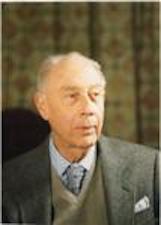FOREWORD
 Born in Cracow, Lucjan
Lewitter (1922-2007) moved to Warsaw at the age of twelve, and then,
four years later, to Cambridge, where the Perse School and Christ’s
College provided successive refuges from the Nazi onslaught. As his
career flourished, so his commitment to his adopted country deepened.
Having succeeded Dame Elizabeth Hill as Professor of Slavonic Studies at
Cambridge in 1968, he joined the nascent Study Group on
Eighteenth-Century Russia and occasionally took part in its annual
meetings. (He once drove me to Hoddesdon in a seat raked back almost
flat on the car floor in the manner of a racing driver, a characteristic
almost as unexpected as his fascination for the casinos of New Jersey.)
Born in Cracow, Lucjan
Lewitter (1922-2007) moved to Warsaw at the age of twelve, and then,
four years later, to Cambridge, where the Perse School and Christ’s
College provided successive refuges from the Nazi onslaught. As his
career flourished, so his commitment to his adopted country deepened.
Having succeeded Dame Elizabeth Hill as Professor of Slavonic Studies at
Cambridge in 1968, he joined the nascent Study Group on
Eighteenth-Century Russia and occasionally took part in its annual
meetings. (He once drove me to Hoddesdon in a seat raked back almost
flat on the car floor in the manner of a racing driver, a characteristic
almost as unexpected as his fascination for the casinos of New Jersey.)
Long before it became fashionable to do so, Lucjan unobtrusively explored the relationship between politics, literature and religion, beginning his academic life with a thesis on the Polish origins of the academic drama in the seventeenth and eighteenth centuries and ending it in 1984, the year of his retirement, with a paper to the Study Group’s international conference at Bloomington on 'Peter the Great's Attitude towards Religion: From Traditional Piety to Rational Theology'. Shortly afterwards came the work for which he is best known, a critical edition of The Book of Poverty and Wealth (1987), Ivan Pososhkov’s memorandum on public finance. But this revealed only one aspect of Lucjan’s lifelong fascination with Russia’s incipient modernity. Earlier in his career, he had published a series of articles on the development of Russia’s commercial and diplomatic interests in the Baltic. These were ultimately intended to form part of a magnum opus on Russo-Polish relations, an inherently controversial subject for which he was exceptionally well qualified, by both background and intellectual formation.

Though never published in his lifetime, Eclipsis Poloniae was virtually complete at the time of Lucjan’s death, and it is with the kind permission of his daughter, Olivia, that we make the text available now. Conceived and written over almost half a century by a scholar who had no access to archives in Poland or the Soviet Union for the duration of his formal career, it is naturally a book of its time. Some of its arguments have been superseded (the same fate awaits us all); others remain debatable (as surely they always will). But no-one will fail to learn from an author who combined an unrivalled mastery of published documents in all manner of languages with a capacity for pithy and provocative judgement. Those who would like to know more about Lucjan may turn to my obituary in The Times, 24 October 2007. But the real key to his richly-textured learning lies in the book you are about to read.
- Simon Dixon, Sir Bernard Pares Professor of Russian History, UCL School of Slavonic and East European Studies
